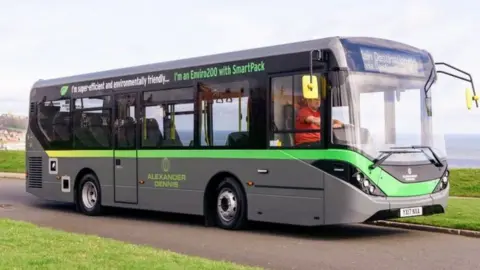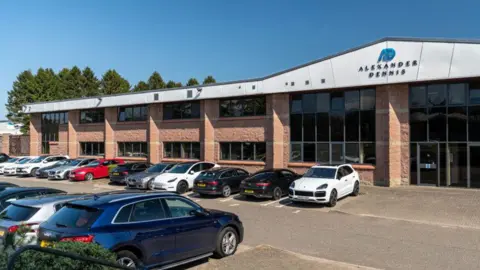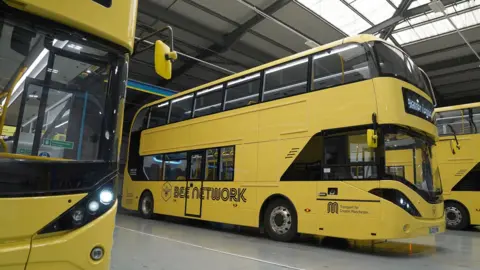Up to 400 jobs at risk at Scottish bus maker Alexander Dennis
 Alexander Dennis
Alexander DennisUp to 400 jobs are at risk after a bus manufacturer announced plans to move operations to England.
Alexander Dennis, which has factories in Falkirk and Larbert, said it was considering moving manufacturing to a site in Scarborough.
The plans would see work at the Falkirk site discontinued, while the Larbert site would be closed after current contracts are completed.
The company said it was facing strong competition from Chinese electric bus manufacturers whose share of the market had risen from 10% to 35%.
Alexander Dennis, which manufactures single and double decker buses, said the new proposed structure would lower costs and increase efficiency.
The firm's president and managing director Paul Davies said: "We must take significant action to drive efficiency to allow our operating model to be competitive.
"It is extremely regrettable that as part of this, we must place jobs at potential risk of redundancy and propose to cease manufacturing operations at some of our facilities."
 Alexander Dennis
Alexander DennisHe said the firm, which is now owned by Canadian parent company NFI Group, was extremely proud of its history in the UK which dates back to 1895.
But he said that change was needed to encourage customers to invest in UK-based manufacturing.
He continued: "The stark reality is that current UK policy does not allow for the incentivisation or reward of local content, job retention and creation, nor does it encourage any domestic economic benefit."
The consultation puts up to 400 roles at Alexander Dennis at potential risk of redundancy, around 22% of the company's whole workforce.
The company employs 1,850 people in the UK, with its biggest plant in Larbert.
Deputy First Minister Kate Forbes said the government had "engaged extensively" with the company in recent weeks in an attempt to mitigate the need for redundancies.
She said: "This will be a hugely worrying time for the workforce at Alexander Dennis, their families and the wider community.
"The Scottish government will continue to explore any and all options throughout the consultation period to allow the firm to retain their hard-working employees and manufacturing and production facilities at Falkirk and Larbert."
 PA Media
PA MediaScottish Labour accused the Scottish government of "selling out" workers saying out of 252 potential orders from the Scottish Zero Emission Bus Challenge Fund buses, only 44 were awarded to Alexander Dennis.
A much bigger order, for more than 160 electric buses, came for the Bee Network in Greater Manchester.
Scottish Labour MP for Falkirk, Euan Stainbank, said: "The reality is the company has not had a consistent pipeline of work because the SNP has been selling out Scottish workers by buying too many buses from abroad.
"Greater Manchester bought more than five times as many buses from Alexander Dennis in Falkirk than the entire Scottish government scheme to date.
"That is an astonishing industrial failure from the SNP."
Scottish Secretary Ian Murray called on the Scottish government to provide a furlough scheme to fund wages in Falkirk while discussions took place with the firm alternatives to closure.
The Scottish Conservatives urged both UK and Scottish ministers to outline how they would support the area and its workforce.
Central Scotland MSP Graham Simpson said: "Our bus market is being taken over by low-cost Chinese imports and we need to see action to end this scandal immediately."
Unite Scottish Secretary said Derek Thomson: "We are absolutely sick to our stomachs.
"Workers building the greener buses of the future now have their livelihoods at risk. This will rock the local area which is already reeling from the Grangemouth oil refinery closure."
The company's connection with Falkirk dates back to 1901 when Walter Alexander opened a cycle shop in Camelon, before he started operating local bus services and excursions.
The company started manufacturing vans and fire engines in the early 1900's but soon switched its attention to building buses and it now specialises in electric and hybrid buses.
In 2019, the firm was sold to the NFI group for £320m. At the the time Stagecoach founders Sir Brian Souter and Dame Ann Gloag owned more than half the Falkirk-based company.
In 2020, the company cut 650 jobs due to the Covid-19 pandemic.
Another 160 jobs were put at risk in September 2024 after the company said contracts were "disproportionately benefitting" foreign competitors with lower labour costs.

Bus-building has a lot of history at Alexander Dennis.
Saved from closure by a group of Scotland's most successful entrepreneurs, it became a rare case of a major exporter of Scottish engineering. Its double-deckers could be seen on the streets of Hong Kong, Hawaii, New York and Canada.
It improved its market position as it adapted for cleaner, greener engines, to meet tightening emission standards. But the full shift to batteries has been a bigger challenge.
Under Canadian ownership for the last six years, it was hard hit by the downturn in bus company income when the pandemic struck.
The arrival of Chinese competition has had a dramatic impact. The main Chinese producers, BYD and Pelican Yutong, are growing rapidly from 10% of the market at the start of last year to 35% of British sales by the end of the year.
While globalisation has had a slow-burning effect on many industries, this is one facing a rapid change. It's also becoming clear that Chinese battery-powered cars pose a big threat to established manufacturers.
If this was in Donald Trump's America, there would be high tariffs slapped on Chinese buses and cars.
But while he aims to choke off Chinese inroads to US markets, one impact could be that China's manufacturing efforts are diverted to countries such as the UK, at even lower cost.
